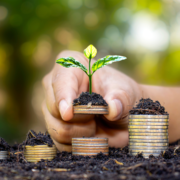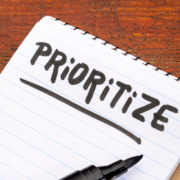You can experience financial freedom like our ancestors who left Egypt
As originally appeared in The Jerusalem Post on April 19, 2024.
“True individual freedom cannot exist without economic security and independence. People who are hungry and out of a job are the stuff of which dictatorships are made.” -Franklin D. Roosevelt
We are just hours away from the Pessach Seder, drinking 4 cups of wine, feasting on bitter herbs and eating more Matzo than is considered as healthy. In the 11th chapter of the Book of Exodus we read how the Lord tells Moshe of the upcoming plague of the firstborn and the command that the Jewish people ask their Egyptian neighbors for their jewelry and clothing.
In the very next chapter we read how the children of Israel, indeed left Egypt with great wealth. Rabbi Yaakov Beasley asks, “The thrice-fold repetition of the act of taking wealth from the Egyptians should cause the reader to wonder – why was this necessary? Clearly, if even the Torah wanted to mention that the Jews were showered with gifts from their neighbors, it could have done so in passing, without placing it in the textual spotlight. In addition, the ethical question of borrowing items from others without any intention of returning them bothered many commentators. What does this story add to our understanding of the Exodus from Egypt?”
The Chizkuni answers that, “As they were leaving, they asked their neighbors and boarders to take their homes and property in exchange for silver and gold articles of equal value, which would be more portable. In doing so, they fulfilled the verse, “And you will save (your property from) the Egyptians.” The word “save” means that the Jewish People leaving Egypt would be able to save their property in this way, and in the verse, “And G-d saved the flock of your father” (Bereishit 31:9). (Commentary to 12:35)
Rabbi Beasley adds, “The acquisition of Egyptian gold and silver was therefore simply a mutual exchange of possessions, and no ethical questions arise.”
He continues, “Another approach is brought from the Talmud (Sanhedrin 91b). According to the Midrash, the Egyptians took the Jewish People to court in the time of Alexander the Great and sued them for the gold and silver that they “borrowed” from them during the Exodus and never returned. An outsider named Gaviah ben Pasisa volunteered to serve as the defense attorney for the Jewish People.
He responded in front of the Greek monarch, “From where do you bring proof that we took the money?” They responded, “From the Torah.” He countered, “Then I will bring proof from the Torah, where it states that the Jewish people dwelled in Egypt for 430 years. Please give us the wages of 600,000 workers for that time period, and we shall return the gold which we took.” The account concludes with the Egyptians requesting a three-day recess, and not returning to the court thereafter.”
We say that in every generation one is obligated to view himself as though he came out of Egypt. As such I’d like to focus on the wealth that was brought out of Egypt. I can’t tell you how often I hear people whining about how difficult it is financially and how they can’t get ahead. The fact is that you can get ahead financially, you just need to make wise decisions. It’s not going to happen suddenly. It takes hard work, discipline and patience. If you decide to purchase something that you can’t afford, it’s no wonder you are going to struggle.
Talking about those who complain, Dr John Deloney said, “Never complain again. Complaining allows you to feel like you’re doing something, without actually doing anything at all. Complaining accomplishes nothing. And yet, it’s our cultural ethos. It’s the air we breathe. Instead of complaining, do something: Laugh, love, forgive, move, let go, say no, say yes, try again, try something new, etc. But whatever you decide to do, first decide to never complain again.”
If you want to achieve financial independence, then you need to start investing. By saying ‘financial independence’, I don’t mean getting rich. Rather I mean that you are self sufficient, have retirement savings and don’t fret when your toilet breaks and you need come up with some money to pay a plumber to fix it. If you start investing 10-15% of your income each month, and generate a 7% annual return, after 20-25 years you will be financially secure. Keep in mind that along the way you will get raises as well.
This leads us to the common assumption that that it’s impossible to save while living in Israel because according to “conventional wisdom,” it’s impossible to save on an Israeli salary. Not true. If you make saving a priority, then you will be surprised at how much you really can save, even in Israel. We all tend to make certain lifestyle choices which impact our financial situation. Whether it’s living in a certain community or choosing to take a particular vacation, our expenses are directly impacted by these decisions. But if we make financial independence an actual priority, we can make the lifestyle changes necessary to save a couple of thousand dollars a year. Along with mandatory pension contributions and Keren Hishtalmut, you already are saving at least 10% of your income. That should be enough but if you can add another 5% on your own, then you will be in great shape.
Enjoy your Matzo!
Chag Kasher V’sameach.
The information contained in this article reflects the opinion of the author and not necessarily the opinion of Portfolio Resources Group, Inc. or its affiliates.
Aaron Katsman is the author of Retirement GPS: How to Navigate Your Way to A Secure Financial Future with Global Investing (McGraw-Hill), and is a licensed financial professional both in the United States and Israel, and helps people who open investment accounts in the United States. Securities are offered through Portfolio Resources Group, Inc. (www.prginc.net). Member FINRA, SIPC, MSRB, SIFMA, FSI. For more information, call (02) 624-0995 visit www.aaronkatsman.com or email aaron@lighthousecapital.co.il.








